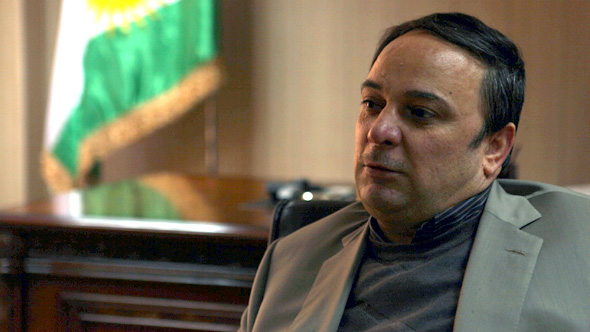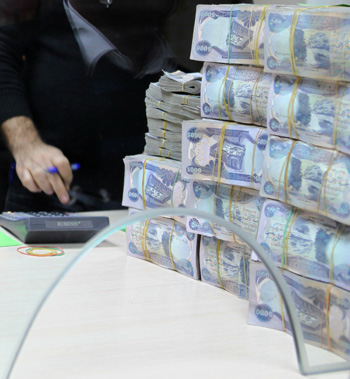Emerald Bank: Iraqi People Must Regain their Trust in Banks
Sabah Milhim Mohi, Chairman of Emerald Bank
Banking is an emerging sector in Iraq and it hasn’t gotten full opportunity yet. Most of Iraqi banks dont have enough capital to make larger investments. Also, majority of Iraqi people dont trust the banking sector – the same applies to the Kurdistan region. Iraqis haven`t yet got accustomed to deposit their money in banks instead of keeping it as cash.
Interview with Sabah Milhim Mohi, Chairman of Emerald Bank

What are the market potentials? Some banks recorded 60% growth, sometimes even 200% growth. In your opinion, what are the banking market potentials in the Kurdistan region? What are the growth percentages for the next 10 years?
In general, banking is an emerging sector in Iraq and it hasn’t gotten full opportunity yet. Most of the banks are still afraid of investing or let’s say they don’t have the necessary financial cover. I think that most of Iraqi banks are family banks investing in very little areas because of their small capital. Secondly, people still don’t trust the banking sector here. People all over the world depend on banks to deposit their money; this is still not widely spread in Iraq.
The next question is about regulations. What do you think about the Central Bank requirements and increasing the capital requirements for banks? The Central Bank keeps on pushing banks to grow and lend more. Do you think this is a good move? Banks are highly liquid and need cash so lending more doesn’t really make sense…
There is nothing wrong with the requirement of the Central Bank of Iraq regarding increasing the capital of banks. In order for banks to operate appropriately, they should have good capital. But what is more important than rules is the right application. As I have mentioned before we have the issue of trust. Till this very moment people are still keeping big amounts of money at their homes while the money should be deposited at the banks to keep it safe and available to be used by banks for investments to generate profits for a certain ratio. So what we should work on is regaining the people’s trust in banks. There are many other sectors in Kurdistan – and generally in Iraq – which are much more profitable than banks. For example when someone invests in a piece of land this will generate a greater margin than it would have generated from keeping the money in a bank.
Do you think these rules will affect the banking sector negatively – especially small banks because these won’t be able to meet the requirements?
The problem is not with the small banks because they will soon merge with other entities to form strong units. In case of Emerald bank for instance, we received it last year and the bank was suffering from a lot of problems when it was under the custody of the Central Bank. It’s not hard to establish a new bank or institution, but it is challenging to take care of a certain entity which suffers from many problems and then try to move it forward. Our bank belongs to a big group and increasing the capital shouldn’t be a problem. So increasing the capital is the right step to be taken because this capital will in the end enter the market. A lot of projects require the help from banks and no country can develop itself without having a strong banking sector.
It’s not hard to establish a new bank or institution, but it is challenging to take care of a certain entity which suffers from many problems and then try to move it forward.
One of the major problems related to the banking sector in both the Kurdistan Region and Iraq is when certain shareholders buy shares or the rights to the banks, and banks become under pressure they won’t be able to meet the requirements or apply the rules. How prevalent is this problem in the banking industry in the Kurdistan Region?
People can go to the Iraqi stock market to buy shares, so I don’t think this is the actual problem. Foreign banks have just started entering Iraq and the Kurdistan region and foreign investors haven’t been properly operating here yet. They are still afraid of the general situation in the country. Nevertheless all financial data and required information are available.
The banking business is run by big banks – including state-owned banks, trade banks and some big private banks in Iraq. This is the main feature of the banking sector in Iraq. How is it different in the Kurdistan region? What is the role of the private banks in Kurdistan?
State-owned and private banks all follow same rules and there is no problem with that, However, I’d like to focus on one single point which I think is the real issue like I have previously indicated: in order for banks to invest properly, people must regain their trust in banks in order to deposit their money in a bank and let the bank use it for its investments. Increasing the capital is not a problem and neither it is a solution.
Now the problem is that the whole banking sector depends on the capital decided upon by the Central Bank of Iraq. We have 30 banks multiplied 200 billion; the resulted number won’t even be enough to do one good project. The Central Bank has rules indicating how to operate but it doesn’t contribute to the development policy.
Where do you see bigger opportunities? Is it in the retail banking or project financing?
Iraq in general and the Kurdistan region too still needs all sorts of investments. The country needs all investments. For instance the real estate sector in Iraq or the Kurdistan region; the country has been through a lot and even millions of residential units won’t be enough. It still needs about 50 years of construction. All sectors need the support of banks. When it comes to industry, we depend mainly on the neighbouring countries.
How compliant are the Iraqi banks with the international standards?
The instruction issued by the Central Bank of Iraq follow the international banking standards – like for example anti-money laundering policies – and as a result both state-owned and private banks follow these international standards. However, banks differ in their own policies in terms of IT or customer service. But generally banks in Iraq and the Kurdistan region do comply with the international banking standards.